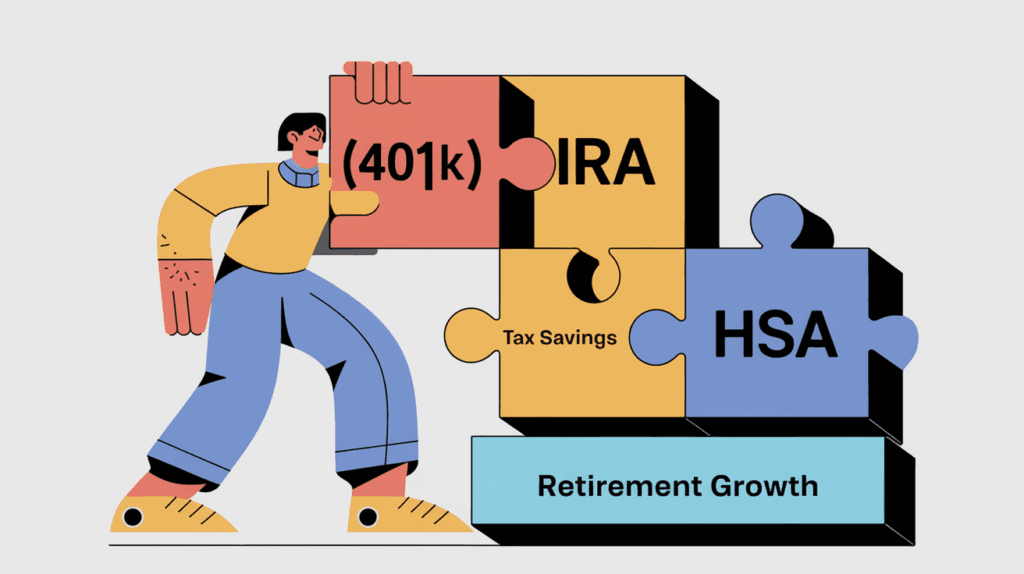Now Reading: 💰 Effective Tax Strategies for Wealth Building
- 01
💰 Effective Tax Strategies for Wealth Building
💰 Effective Tax Strategies for Wealth Building

Introduction
Building wealth isn’t just about earning more money—it’s also about keeping more of what you earn. Smart tax strategies can help you legally reduce your tax burden and accelerate your journey to financial independence.

1. Maximize Retirement Account Contributions
Take full advantage of tax-advantaged retirement accounts:
- 401(k) or 403(b): Contributions reduce your taxable income and grow tax-deferred.
- Traditional IRA: Tax-deductible contributions depending on your income.
- Roth IRA: No immediate tax break, but withdrawals in retirement are tax-free.
💡 Tip: If your employer offers a 401(k) match, contribute enough to get the full match—it’s free money!
2. Use Health Savings Accounts (HSAs)
An HSA offers triple tax benefits:
- Tax-Free Contributions: Reduce your taxable income.
- Tax-Free Growth: Earnings grow without being taxed.
- Tax-Free Withdrawals: Use funds for qualified medical expenses.
💡 Tip: Even if you don’t use the funds now, HSAs can act as an additional retirement account, as you can withdraw funds penalty-free after age 65 for any purpose (though non-medical withdrawals are taxed).
3. Take Advantage of Tax-Loss Harvesting
Offset capital gains by selling investments at a loss:
- How It Works: If you sell a stock at a loss, you can use that loss to offset other gains.
- Annual Limit: Deduct up to $3,000 in capital losses against ordinary income.
💡 Tip: Reinvest the proceeds in a similar (but not identical) investment to maintain your portfolio balance.
4. Claim All Eligible Tax Deductions and Credits
Make sure you’re not leaving money on the table:
Common Deductions:
- Mortgage interest
- Student loan interest
- Charitable donations
- Medical expenses (if exceeding 7.5% of AGI)
Popular Tax Credits:
- Child Tax Credit: Up to $2,000 per child under 17.
- Earned Income Tax Credit (EITC): For low- to moderate-income earners.
- Saver’s Credit: For retirement contributions if you meet income limits.
💡 Tip: Keep track of expenses throughout the year to make tax time easier.

5. Consider Tax-Efficient Investments
Certain investments are more tax-friendly than others:
- Municipal Bonds: Interest is typically tax-free at the federal level.
- Index Funds and ETFs: They generate fewer taxable events than actively managed funds.
- Growth Stocks: You only pay taxes when you sell, allowing gains to compound tax-deferred.
💡 Tip: Hold investments for more than one year to benefit from lower long-term capital gains rates.
6. Explore Business Tax Deductions (If Self-Employed)
Running a business or side hustle? You can deduct:
- Home office expenses
- Business-related travel and meals
- Office supplies and equipment
- Internet and phone bills
💡 Tip: Keep detailed records to justify deductions in case of an audit.
7. Make Charitable Contributions Strategically
Donating to charity not only helps others but can reduce your taxable income:
- Donate Appreciated Assets: Avoid capital gains tax while claiming the full market value as a deduction.
- Bunch Contributions: If your donations don’t exceed the standard deduction, consider making multiple years’ worth of donations in one year.
💡 Tip: Keep receipts for all charitable donations.

Conclusion
By implementing these effective tax strategies, you can build wealth faster while keeping more of your hard-earned money. Start small, stay consistent, and consult with a tax advisor to optimize your tax plan further.




























